Comparison of Characters
Many
of the hieroglyphs or other non-Roman characters appearing in the
nineteenth-century documents in this volume have been assigned a numeric
designation for ease of citation, reference, and comparison. Characters
have been numbered in the order in which they appear in Egyptian
Alphabet–A.
This chart allows readers to compare the
instances of a character and its associated information across all the
documents in which that character appears. It presents images of the
characters, their “sounds” (or transliterations), and their
“explanations” (or definitions). In some instances, the documents do not
contain all of those elements for a given character; the chart reflects
what is contained in the documents. Characters are organized according
to their editorially assigned numbers, and the bulk of the characters
are grouped according to the “part,” or subsection, in which they appear
in Egyptian
Alphabet–A. Characters that appear in the -era manuscripts of the Book of Abraham but not in
any of the Egyptian-language documents are grouped together at the end
of the chart. Often, a single character appears multiple times in the
Grammar
and Alphabet of the Egyptian Language. In the table,
therefore, references to the Grammar and Alphabet volume are listed
under the part and degree of that volume in which the character appears.
It is not always clear whether a character on the papyri was the precise
source for a character copied into the Egyptian Alphabet documents or
the Grammar and Alphabet volume. Such cases are marked with an asterisk
in this chart.
Canceled characters are not numbered in the
body of this volume and are therefore not included in this chart. The
same is true of other unnumbered characters, such as those that appear
in the Egyptian Counting document. While the transcriptions that appear
in this chart have been checked against the documents themselves, the
format of this chart does not allow for transcriptions to be rendered in
as much detail as the typographic facsimiles elsewhere in the volume do.
Readers should therefore refer to the body of this volume for the most
complete and authoritative transcriptions.
Key
Part 1
| No. | Doc. | Character | Sound | Explanation |
| 1.1 | A |  |
ah | the first being who exercises Supreme power |
| B |  |
Ah | The first Being who exercises Supreme powe[r] | |
| C |  |
ah | The first Being, who exercises supreme power | |
| P1,D5 | 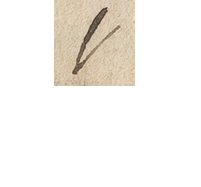 |
Ah lish | The first Being— supreme intillegence; supreme power; supreme glory= supreme Justice; supreme mercy without begining of life or end of life comprehending all things, seeing all things: the invisible and eter[n]al godhead. | |
| P1,D4 |  |
Ahlish-= | The first Being clothed with supreme glory. | |
| P1,D3 |  |
Ahlish. | Supreme power | |
| P1,D2 |  |
Ahlish. | The name of the first Being: supreme intelligence— | |
| P1,D1 |  |
Ahlish= | The name of the first being | |
| 1.2 | A |  |
pha-e | the first man or one who has Kingly power or K[ing] |
| B |  |
Pha-e | The first man, or one who has kingly power, or [king] | |
| C |  |
Pha=e | The first man, or one who has Kingly power, or king | |
| P1,D5 | 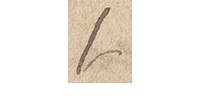 |
Phah eh. | The first man, or Adam coming from Adam. Keys or right over Patriarchal right by appointment. | |
| P1,D4 |  |
Phah=eh | Kingly power coming from some other Kingly power | |
| P1,D3 |  |
Phah=eh. | Kingly <power,> or first king | |
| P1,D2 |  |
Phah=eh | Kingly power=or king | |
| P1,D1 |  |
Pha<h>=eh— | The first man.— Adam, first father | |
| 1.3 | A |  |
pha | a more universal reighn having g[r]eater dom[in]ion or power |
| B |  |
Pha | A more universal reign, having greater d[o]<minion or po[wer]> | |
| C |  |
Pha | a more universal reign, having greater dominion, or power | |
| P1,D5 |  |
Phaah. | The Largest riegn, the greatest dominion, possessions or power. | |
| P1,D4 |  |
Phauh Phaah | Extending the Dominion, possession and power still further. | |
| P1,D3 |  |
Pha ah | Havinng still greater dominion, or possesion or Power. | |
| P1,D2 |  |
Pha=ah— | Having greater dominion, or possession or power. | |
| P1,D1 |  |
Pha-ah— | a more universel reign | |
| 1.4a,b | A |  |
phaloeup | rolyal family royal blood or pharaoah or supreme power <or> King |
| B |  |
Pha-ho-e-oop | Royal family, royal blood, or pharaoh, or supreme power <power, or king> | |
| C |  |
Pha=ho=e=oop | Royal family, Royal blood, or Pharaoh, or supreme power, or King | |
| P1,D5 |  |
Phah ho e oop— | A king who has universal dominion, over all the earth. | |
| P1,D4 |  |
Phah ho e oop | =extension of power by marriage or by ordination, or annointing | |
| P1,D3 |  |
Phah ho e oop | an extension of power | |
| P1,D2 |  |
Phah ho e oop. | Royal blood or pharoah | |
| P1,D1 |  |
Phah-ho-e-oop | The lineage of the royal family | |
| 1.5 | A |  |
ho up hah | crown of a princess or queen or Stands for queen |
| B |  |
Ho-oop-hah | Crown of a pri[n]cess, or queen, or signifies queen. | |
| C |  |
Ho-oop-hah | Crown of a princes, or signifies Queen. | |
| P1,D5 | 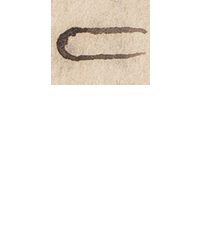 |
Ho oop hah | Queen Kah tou mun, a distinction of of Royal <female> lineage or descent, from her whom Egypt was discovered while it was under water, who was the daughter of Ham.— a lineage with whom a record of the fathers was intrusted by the tradition of Ham and accordding to the tradition of their elders; by who<m> also the tradition of the art of embalming in was kept. | |
| P1,D4 |  |
Ho oophah. | Queen who has been married the second time | |
| P1,D3 |  |
Ho oop hah— | Crown of a widowed queen | |
| P1,D2 |  |
Ho oop hah— | Corwn [crown] of a married queen | |
| P1,D1 |  |
Ho-oop=hah. | Crown of a princes[s], or unmarried queen | |
| 1.6 | A |  |
Zi | Virgen unmaried or the pri[n]ciple of vi[r]tue |
| B |  |
Zi | Virgin, unmarried, virtuous, or the principle of virtue. | |
| C |  |
Zi | virgin, unmarried, virtuous, n◊ or the principle of virtue. | |
| P1,D5 | 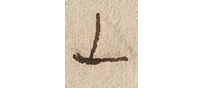 |
Zi | most virtuous, comely and beauti=ful, modest and chaste, being taught most perfectly and upright. | |
| P1,D4 |  |
Zi | One possessing greater beauty, modesty and virtue, taught more perfectly | |
| P1,D3 |  |
Zi | Affability of manners, virtuous w[e]ll taught | |
| P1,D2 |  |
Zi | The principle of virtue— a young female adorned with the modesty of virtue and comeliness | |
| P1,D1 |  |
Zi— | virgin or an u[n]married female | |
| 1.7 | A |  |
Kah tou man | the name of a royal family in female line |
| B |  |
Kah-tou=mun | The name of the a royal family— The female line | |
| C |  |
Kah=tou<=>mun | The name of the <a> royal family, in the female line | |
| P1,D5 | 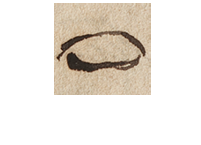 |
Kah tou mun: | a lineage with whom a record of the fathers was intrusted by tradition of Ham, and according to the tradition of their elders, by whom also the tradition of the art of of embalming was kept. | |
| P1,D4 |  |
Kah tou mun. | a lineage, a daughter of Ham. | |
| P1,D3 |  |
Kah tou mun | descent from her by whom Egypt was discovered while it was under water. | |
| P1,D2 |  |
Kah tou mun, | a distinction of royal female lineage | |
| P1,D1 |  |
Kah-tou-mun | The name of a Royal family in the female line | |
| 1.8 | A |  |
Zie oop hah | An unmaried woman and a vi[r]gin pri[n]cess |
| B |  |
Zi-oop=hah | An unmarried woman and a virgin princess | |
| C |  |
Zi=oop-hah | An unmarried woman, & a virgin, a princes[s] | |
| P1,D5 |  |
Zi oop hah— | A young virgin unmarried woman | |
| P1,D4 |  |
Zi oop hah | a beautiful virgin, one who is fair to look upon, and ad-mired for her beauty | |
| P1,D3 |  |
Zi oophah— | a distinction by Pharoah a princess of Egypt. | |
| P1,D2 |  |
Zi oop hah | a distinction by right of heirship by Pharaoh | |
| P1,D1 |  |
Zi-oop-hah | An unmarried woman, a virgin Princess | |
| 1.9 | A |  |
ho-ee-oop | young unmarried man a pri[n]cess |
| B |  |
Ho=e-oop | A young unmarried man, a prince. | |
| C |  |
Ho=e=oop | A young unmarried man— a prince. | |
| P1,D5 | 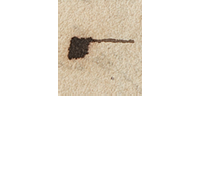 |
Ho-e-oop | A prince of the royal blood a true desendant from Ham, the son of Noah, and inheritor of the Kingly blessings from under the hand of Noah, but not according to the priestly blessing, because of the trangrissions of Ham, which blessing fell upon Shem from under the hand of Noah | |
| P1,D4 | 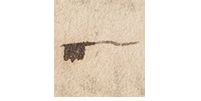 |
Ho e-oop | a prince of the royal blood a true desendant from Ham. the Son of Noah a true descendant from Ham— The Son of Noah. | |
| P1,D3 |  |
Ho e oop— | A prince of the line of the Pharoahs | |
| P1,D2 |  |
Ho e oop | A virtuous prince | |
| P1,D1 |  |
Ho e oop | A young unmarrid man; a prince | |
| 1.10 | A |  |
Zip Zi | woman married or unmarried or daughter |
| B |  |
Zip-si <Zip-zi> | A women married or unmarried,.— daughter | |
| C |  |
Zip=zi | a woman, married or unmarried,= daughter | |
| P1,D5 |  |
Zip Zi- | is the same of the fourth only increases or lessens five degrees. | |
| P1,D4 |  |
Zip Zi: | all women: it took its origin from the earth yielding its fruit. And from the first woman who bore children; and men were multiplied upon the earth, and is used in this degree as a numeral by being inserted above or below another character: it increases by b[e]ing drawn above, it and signifies above, more, greater, more glorious, and when inserted under signifies beneath less smaller least. | |
| P1,D3 | 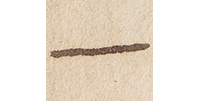 |
Zip Zi— | under or beneeath, second in right or in authority or Government, a fruitful place or fruitful vine | |
| P1,D2 |  |
Zipzi— | a woman married or unmarried or a daughter, or mother, or mothers, and sometimes the first woman, who was Eve | |
| P1,D1 |  |
Zip Zi— | a woman married or unmarried or daughter, signifies all, or any woman | |
| 1.11 | A |  |
ho-ee oop hah | Crown of a prince or King |
| B |  |
Ho=e=oop-hah | Crown of a prince, or King. | |
| C |  |
Ho-e=oop=hah | crown of a prince, or King | |
| P1,D5 | 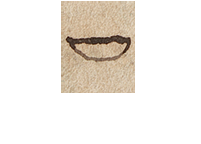 |
Ho e oop hah— | honor by birth, kingly power by the line of Pharoah. possession by birth one who riegns upon his throne univer=sally— possessor of heaven and earth, and of the blessings of the earth. | |
| P1,D4 |  |
Ho e oop hah= | Kingly possessions— right of possession, title, dignity, honor. | |
| P1,D3 |  |
Hoe oop hah— | kingly power, dominon, right | |
| P1,D2 |  |
Ho=e-oop=hah: | a king: | |
| P1,D1 |  |
Ho=e oop=hah: | Crown of a prince | |
| 1.12 | A |  |
one-ahe or ohe | the Earth |
| B |  |
Oan, or ah-e, or Oh-e. | The earth | |
| C |  |
Oan, <or> ah=e <oh=e> | The earth | |
| P1,D5 | 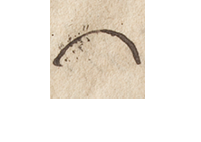 |
Sue= | To point out subject— that is, it signifies a continuation of the subject: also to designate one sentence from another, according to the differnt marks of punctuation signifying the whole of any thing or the whole earth. | |
| P1,D4 |  |
Sue= | To point out subjects | |
| P1,D3 |  |
Auh eh— | Earth and water | |
| P1,D2 |  |
Ahe. | inh[ab]itable part of the earth | |
| P1,D1 |  |
Oan. | The Earth | |
| 1.13 | A | 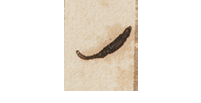 |
tone tahe or th tohe tou-es | beneath or under water |
| B |  |
Toan, Tah-e-Ta◊◊ Tah-e-Ta-e, or Tus. | or water. | |
| C |  |
Tus, toan, tahe ta<,>e or tou=es= | beneath, below, under, water | |
| P1,D5 |  |
Toan tou ee tahee tahee toues: | under the Sun: under heaven; downward; pointing downward going downward; stooping down going down in<to> another place,= any place: going down into the grave— going down into misery= even Hell; coming down in lineage by royal descent, in a line by onitas one of the royal families of the Kings the of Egypt. | |
| P1,D4 | 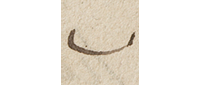 |
Toan tau ee, tah ee, tah eh toues: | exceeding bad adultery: having descended below some other principle | |
| P1,D3 | 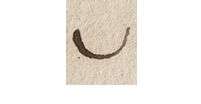 |
Toan tou=ee tah ee tah eh tou es: | under the earth anything that is beneath some other thing— under water or water. also in some instances Fish | |
| P1,D2 | 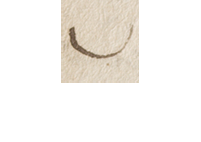 |
Toan. tou ee tah-ee tou tah eh toues: | under water water, under the earth. | |
| P1,D1 |  |
Toan, toe tou=e◊ ee t◊ tah es ee toues toueh tou es.— | A principle that is beneath, disgusting— not fit | |
| 1.14 | A |  |
Iota | the eye or to see or sight sometimes me myself |
| B |  |
Iota | The eye, or to see, or sight, sometimes me, myself. | |
| C |  |
◊◊ta Iota | Eye=to see=sight, sometimes Me, myself | |
| P1,D5 |  |
Iata— | see, saw seeing or having seen | |
| P1,D5 |  |
Iota | See, saw, seeing, or having seen or having been seen. | |
| P1,D4 |  |
Iota— | me myself | |
| P1,D4 |  |
Iata | me myself | |
| P1,D3 |  |
Iota— | sight | |
| P1,D3 |  |
Iato | I shall or will see that which is to come | |
| P1,D2 |  |
Iota. | To see: | |
| P1,D2 |  |
Iata | Having Seen or sight | |
| P1,D1 |  |
Iota or Ki | The eye; | |
| P1,D1 |  |
Iota= | The eye, or I see: | |
| 1.15 | A | 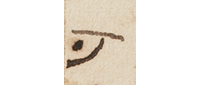 |
Iota tou-es Zip-Zip | the land of Egypt first seen under <water> |
| B | 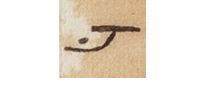 |
Iota-Tou-es-Zip-zi. | The land of Egypt first discovered under <water by a woman.> | |
| C | 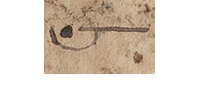 |
Iota tou=es Zipzi= | Egypt. The land first seen, by a woman, under water | |
| P1,D5 | 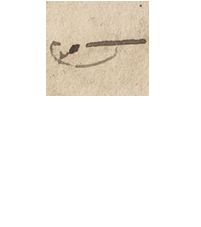 |
Iota toues Zip Zi: | The land of Egypt which was first discovered by a woman <wh[i]le underwater>, and afterwards settled by her Sons she being a daughter of Ham— any land over flown with water— a land seen when overflown by water:— land overflown by the seasons, land by enriched by being overflown low marshy ground. | |
| P1,D4 | 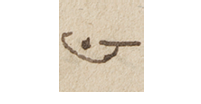 |
Iota toues Zip Z | The land of Egypt discovered by a woman, who afterwards setled persons in it. | |
| P1,D3 | 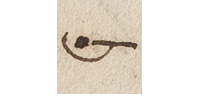 |
Iota toues Zip Zi. | The woman sought to settle her sons in that land. she being the daughter of Ham | |
| P1,D2 | 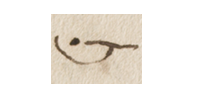 |
Iota tou-es Zip zi | The land which was discovered under water by a woman | |
| P1,D1 | 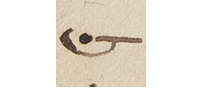 |
Iota toues-Zipzi: | The land of Egypt | |
| 1.16 | A |  |
Sue Eh ni | what other person is that or who |
| B |  |
Su-e-eh=ni | What other person is that? Who. | |
| C |  |
Su=e=eh=ni | What other person is that? Who? | |
| P1,D5 |  |
Su-e-eh-ni | The same as the first. | |
| P1,D4 |  |
Sueehni | The same as the first. | |
| P1,D3 |  |
Sueehni | The same as the first | |
| P1,D2 |  |
Su e-eh-ni. | The same as in the first degree | |
| P1,D1 |  |
Su-e-eh ni: | who, whence,? &c an interrogative pronoun through its degrees | |
| 1.17 | A | 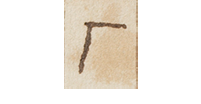 |
ho-ee oop-pha-e hah pha◊e pha-e | goverment power or Kingdom |
| B |  |
Ho-e-oop-hah-pha-e. | Reign, government, power, kingdom, or domin[i]on. | |
| C |  |
Ho=e=oop hah=Pha=e— | Reign, government, <power> right, Kingdom | |
| P1,D5 |  |
Hoeoophahphaheh | Patriarchal government; or authority; a land governed according to the pattern or order given to the patriarchs or fathers; rules and laws <of a government> administered by the direction of Heaven or God. a people living under the law<s> of the gospel: or that law by which they may be sanctified and see the face of God. A priestly government; a government administered by the authority of the priesthood up or under the patriarchal: it sometimes means any priestly governments whether by the dierection of heaven or by the tradition of the heaven. | |
| P1,D4 | 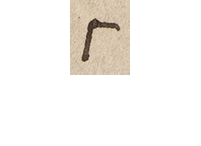 |
Hoe-oop hah phaheh: | A land, Kingdom or dominion governed by wise, upright kings or rulers, or jud[g]es or governors in administring equetable laws for the benefit and comfort of the poor; charity and favor to the poor | |
| P1,D3 | 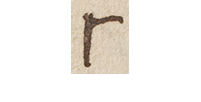 |
Hoeoophahphaheh. | A land Kingdom of or country, governed, by wise upright rulers or kings, or Judges,— good, excellent, and whole some laws | |
| P1,D2 | 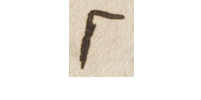 |
Ho e oop hah phah eh. | The principle of rule or ruling or reigning upon the principles of Justice equity and righteousness | |
| P1,D1 | 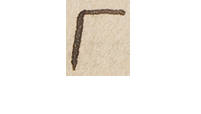 |
Ho=e-oop=hah=Phah eh: | Reign or rule, govern=ment, power, Kingdom or dominion. | |
| 1.18 | A |  |
Zub Zool oun | the begining first before pointing to |
| B |  |
Zuh=sool-o◊n <Zuh=zool-oan>. | The beginning, first, before, or pointing <to> | |
| C |  |
Zub-zool=oan | The begining,= first, before appointing to | |
| P1,D5 |  |
Zub zool-oan— | The first born, or the first man or fathers or fathers | |
| P1,D4 |  |
Zub zool oan | pointing to some particular subject | |
| P1,D3 |  |
Zubzool oan— | before some other time. | |
| P1,D2 |  |
Zub Zool=oan— | The first of anything | |
| P1,D1 |  |
Zub-Zool-oan | The begining of time; | |
| 1.19 | A |  |
Zub Zool Eh | in the begining of the E[a]rth <or> Creation |
| B |  |
Zub=sool=eh <Zub=zool=eh>. | In the beginning of the earth, or crea<tion.> | |
| C |  |
Zub=zool oan=eh. | In the beginning of the earth, or Creation | |
| P1,D5 | 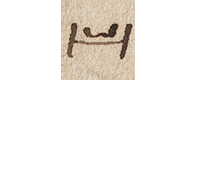 |
Zub Zool eh: | In the days of the first patrarch<s> of In the reign of Adam; in the days of the first patriarchs; in the days of Nooh; in the blessings of Noah; in the blessings of the children of Noah; in the first blessings of men; in the first blessings of the church: | |
| P1,D4 | 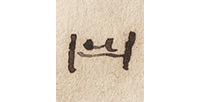 |
Zub=zool-eh: | The first inhabitenits <in the garden <of> Eden>: <in> the first generations; in the first church | |
| P1,D3 | 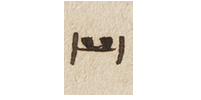 |
Zub=zool=eh: | The earth in the begining; with its rivers, brooks and springs, with its blessings of fruit, trees and flowers, herbs and plants. beasts and birds | |
| P1,D2 |  |
Zubzooleh: | The earth as it was in the beginning: or at its creation; creation or beginning | |
| P1,D1 |  |
Zubzool eh:— | In the begining of the earth or creation. | |
| 1.20 | A |  |
Zool Eh | Signifys to be in any as light in th[e] E[art]h |
| B |  |
Zub-s◊◊l <z◊◊l> eh | To be in, or be within—as light in the earth. | |
| C |  |
Zub=eh— | To be in—as light in the earth | |
| P1,D5 | 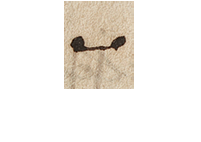 |
Zub eh | Having been within= in the earth= in the sea; in any thing; b[e]ing applied to any condition or situation, to express one thing <or principle> or being in another. | |
| P1,D4 |  |
Zubeh | saw in, or within; | |
| P1,D3 |  |
Zub eh: | b[e]ing in or within | |
| P1,D2 |  |
Zub-eh | To be with as, as light is in the earth | |
| P1,D1 |  |
Zub=eh | To in bee in; | |
| 1.21 | A |  |
Zub | the first Creation of any thing first insti[tu]tion |
| B |  |
Zub | First creation of any thing, first institution. | |
| C |  |
Zub | The first creation of any thing or <or first institut[io]n> | |
| P1,D5 | 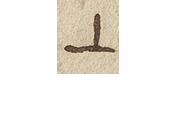 |
Zub | a road or a highway; leading up or to: the time for going up to the altar to worship: <going up before the Lord.> b[e]ing caught up, going to be caught up, having been caught up. | |
| P1,D4 | 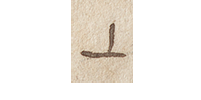 |
Zub | Having gone up to some particular place; for the act of going up to going up, climbing, ascending towards the sun | |
| P1,D3 |  |
Zub | pointing to that which is to come. pointing to any fixed period: | |
| P1,D2 |  |
Zub. | pointing to that which has been created To the first institution or first prin=ciple: | |
| P1,D1 |  |
Zub— | The first creation of any thing: the first institution; first principle; | |
| 1.22 | A |  |
zub zool | from the first to any Stated peried after |
| B |  |
Zub-sool <Zub-zool> | From the first to any stated period after— | |
| C |  |
Zub zool | from the fi[r]st to any stated period after | |
| P1,D5 |  |
Zub zool | From the beinng [beginning] of the creation until now; pointing out or designating at the present time; having foreordained, or decreed or having before seen; For instance: Abraham haveing been chosen before was sent by commandment into the Land of Canaan: Having preached the gospel unto the heathen, was forewarned of God to go down into Ah=meh=strah, or Egypt, and preach the gospel <unto the> Ah meh strah ans; | |
| P1,D4 | 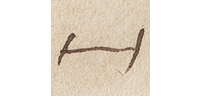 |
Zubzool | Having pointed to some place= refering to any particular subject or thing as having came out from my fathers house | |
| P1,D3 | 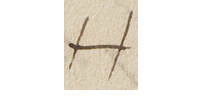 |
Zubzool | pointing to the end of a fixed period a road which leads to Some particular place: for instance: from Chaldea I travelled to dwell in the land of Canaan | |
| P1,D2 |  |
Zub Zool | from the present time unto some stated period after. | |
| P1,D1 |  |
Zubzool | From the first to any stated period after | |
| 1.23 | A | 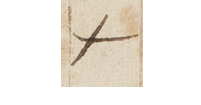 |
Zool | from any or some fix<ed> peried of time <back> to the begining <of the creation> |
| B |  |
Zoal Zool | From a fixed period of time back to the begin<ning or creation> | |
| C |  |
Zool | From a <any> fixed period of time back to the begining | |
| P1,D5 |  |
Zool— | from any or some fixed period of time back to the beginning of creation showing the chronology of the patriarchs the right of the priesthood, and the l[i]neage through whom it shall be continu[e]d by promise, begining at Abraham signifying the promises made to Abraham saying through thy priests, or the seed of thy loins, shall the gospel shall be preached, unto all the seed meaning from Noah, and unto all the kindreds of the earth. | |
| P1,D4 | 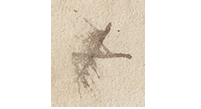 |
Zool: | Sign[i]fying the lineage that lawfully hold the keys of the Kingdom of God by promise. | |
| P1,D3 | 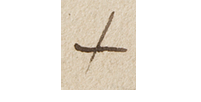 |
Zool | showing the denomination of languages and through what descent they came and are to continue by promise | |
| P1,D2 | 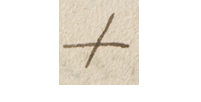 |
Zool: | From Abraham back to his father and from Abraham’s father back to his father and so on back through the line of <his> progenitors | |
| P1,D1 |  |
Zool: | From any fixed period of time back to the begin[nin]g: |
Part 2
| No. | Doc. | Character | Sound | Explanation |
| 2.1 | A |  |
Ahneeos <Ahmeos> | God without begining or end Go |
| B |  |
Ah-me-os | God, without beginning or end | |
| C |  |
Alpha-om◊gas Ah me os- | God without beginning or end | |
| P2,D1 |  |
Ahme=os= | God without begining or end | |
| 2.2 | A |  |
Aleph | in the begining with God the Son or <first born> |
| B |  |
Aleph | In the beginning with God, the Savior. | |
| C |  |
Aleph | In the beginning with God the Son or first born | |
| P2,D2 |  |
Aleph, | In the begining with God, the son, or first born | |
| 2.3 | A |  |
Albeth | Angels or disimbodied spirits <or> Sainnts |
| B |  |
Albeth | Angels or disemboded spirits, or saints | |
| C |  |
Albeth | Angels or disembodied spirits or Saints. | |
| P2,D3 |  |
Albeth. | Angels or disembodied spirit or saints. | |
| 2.4 | A |  |
Alcabeth | Angels in an unalterable immortal <state> |
| B |  |
Alkabeth | Angels in an unalterable state— Sanctified <or men after they are raised <from the de[a]d>> | |
| C |  |
Alkabeth | Angels in an unalterable state, men after they are raise <from the dead> | |
| P2,D4 | 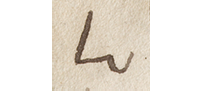 |
Alkabeth, | angels in an unalterable and immortal State; men after they are raised from the dead, and translated unalterable state. | |
| 2.5 | A |  |
Achibeth <Achebeth> | minersters of God high preasts <Kings> |
| B |  |
Al◊◊ebeth Alchebeth | Ministers of God, high priests, Kings. | |
| C |  |
Alchebeth | Ministers of God, high priests, Kings | |
| P2,D5 |  |
Alkebeth, | ministers of God, high priests, kings | |
| 2.6 | A |  |
Alchobeth <Alchibeth> | ministers of God under or the less |
| B |  |
Alchebeth <Alchibeth> | Ministers of God, less, or under the high priests | |
| C |  |
Alchobeth <Alchibeth> | Ministers of God, und◊r less than high priests— | |
| P2,D1 |  |
Alkibeth | minister of God under or the less | |
| 2.7 | A |  |
Alchubeth <Alchobeth> | ministers not ordained of God Sinful |
| B |  |
Alkubeth <Alkobeth> | Ministers not ordained of God, sinful | |
| C |  |
Alkubeth <Alkobeth> | Ministers not ordained of God, sinful | |
| P2,D2 |  |
Alkobeth, | Ministers not ordained of God Sinful | |
| 2.8 | A |  |
Alchybeth <Alchubeth> | ministers who are less sinful for want of <power> |
| B |  |
Alkibeth <Alkubeth> | Ministers who are less sinful for want of power | |
| C |  |
Alki◊beth <Alkubeth> | Ministers who are less sinful for want of power | |
| P2,D3 |  |
Alkubeth | Ministers who are less sinful for want of power | |
| 2.9 | A |  |
Baeth | the name of all mankind man or men |
| B |  |
Baeth | The name of all mankind, man, or men. | |
| C |  |
Ba=eth | The name of all Mankind—man or men | |
| P2,D4 |  |
Baeth— | The name of all mankind, man or men | |
| 2.10 | A |  |
Baeth Ka | Adam or the first man or first King |
| B |  |
Baeth-ka | Adam, or the first man, or first king | |
| C |  |
Ba=eth=ka | Adam or the first man, or first King | |
| P2,D5 |  |
Baethka. | Adam or the first man, or first king | |
| 2.11 | A |  |
Baeth Ke | the next from Adam one ordained under <him> |
| B |  |
Baeth-kee | The next from Adam, one ordained under <him> | |
| C |  |
Ba-eth kee | The next from Adam, one ordained under him. | |
| P2,D1 |  |
Baethkee | The first next from Adam, one one ordained under him, a patriarch or the right of the first born. | |
| 2.12 | A |  |
Baeth Ki | the third patrearck |
| B |  |
Baeth-ki | The lineage <third ordaind> King under Adam. third patriarck | |
| C |  |
Ba-eth ki | The line <third> ordained under Adam | |
| P2,D2 |  |
Baethki | The third patriarch: or right of the first born | |
| 2.13 | A |  |
Baeth Ko | the fourth from Adam |
| B |  |
Baeth-ko | The forth from Adam | |
| C |  |
Ba-eth ko | The fourth from Adam | |
| P2,D3 |  |
Baeth Ko | The fourth patriarch from Adam the r[i]ght of first born | |
| 2.14 | A |  |
Baethchu | the fifth high preast from Adam |
| B |  |
Baeth-Ku | The fifth high priest from Adam | |
| C |  |
Baeth ku | The fifth high priest from Adam | |
| P2,D4 |  |
Baethku | The fifth high priest from Adam | |
| 2.15 | A |  |
Beth | mans first residence frui[t]ful garden A great valy a place of hapiness 1 times |
| B |  |
Beth | Man’s first residence in a fruitful garden, a great valley or plain filled with fruit, trees and flowers, <good to the taste, pleasing to the eye and p sweet & precious to the smell—> place of happiness | |
| C |  |
Beth | Man’s firrst residenc, a fruitful garden <a great valley> | |
| P1,D5 |  |
Beth | place of happiness, purity, holiness & rest | |
| P1,D4 |  |
Beth— | sweet and precious to the smell | |
| P1,D3 |  |
Beth— | good to the taste, pleasing to the eye | |
| P1,D2 |  |
Beth— | a fruitful garden, or a great valley or plain filleed with fruit trees and flowrs | |
| P1,D1 |  |
Beth= <Be=eth> | This character is found on the fi[r]st degree It has an arbitrary sound or signification which is Beth; and also a compound sound which is Za, and comprises one simple sentince for its signifacation It is only increased or lessened in its signification by its connection with other characters. one connection with another character, gives it a compound signification, or enlarges the sentence: Two connections increases its signification still: Three increases it still: Four increases still. and five still, This is as far as a sentence can be carried in the first degree. In its arbitrary sound it may have more sounds than one, but can not have more than five sounds. When it is compounded with others, it can only have one sound. | |
| P2,D5 |  |
Beth, | man’s The place appointed of God for the residence of Adam; Adam ondi= Ahman a fruit garden made to be fruitful, by blessing or promise; great valley or plain given by promise, fitted with fruit trees and precious flowers, made for the healing of Man. Good to the taste pleasing to the eye; sweet and precious <deligh[t]ful> to the smell; place of happiness— purity, holiness, and rest: even Zomah <Zomar> o◊in Zion | |
| 2.16 | A |  |
Bethcha | an other place of residence or <a> an more fruitful Garden or larger place of hapiness greater hapiness 5 times |
| B |  |
Beth-Ka | A garden, valley or plain, larger, more spacious, more pleasing, more beautiful— place of more complete happiness, peace & rest <for man.> | |
| C |  |
B◊◊◊ Beth ka | Another place of Residence, <5 times as great than the firsts> more spacious, <&> larger | |
| P1,D5 |  |
Bethka | the greatest place of happiness exceeding extending beyond any thing | |
| P1,D4 |  |
Bethka— | a more complete enjoyment— a more beautiful place in creasing in beauty | |
| P1,D3 |  |
Bethka— | pleasing, Beautiful, a place of exceeding great beauty— | |
| P1,D2 |  |
Bethka— | a larger garden— more spacious plain | |
| P1,D1 | 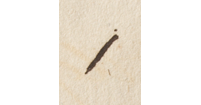 |
Beth ka— | A large garden, a large valey or a large plain, This aught <to> have been inserted between Iota and Zub Zool aon on the opposite page. | |
| P2,D1 | 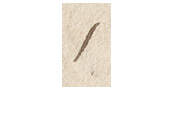 |
Bethka— | Another & larger place of residence made so by appointment. by extension of pow=er; more pleasing, more beautiful: a place of more complete happiness, peace and rest for man. | |
| 2.17 | A |  |
Bethche | the third place 5 times Bethcha |
| B | 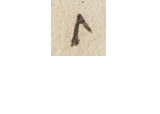 |
Beth-kee <Beth-Kee> | A Third garden, or place of residence still more spacious, beautiful and pleasing— increasing in greatness five degrees <or being five times as large as Beth=ka.> | |
| C |  |
Beth ke | The third place of Residence <5 times as great as the last> still greater &c | |
| P2,D2 | 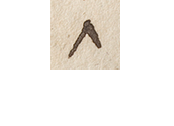 |
Bethkee; | a place that has been e[n]larged that has been a place of residence; that has been a more fruitful garden. has been a larger place of happiness; hav[in]g had greater happiness | |
| 2.18 | A |  |
Bethchi | the fourth place 5 times Bethche |
| B |  |
Beth-Ki | A Fourth, increasing five degrees beyond Beth-Kee. | |
| C |  |
Beth ki | The fourth place 5 times that of the last. | |
| P2,D3 | 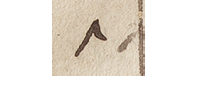 |
Beth Ki= | The fourth place which will be a more fruitful garden; which will be a place of greater happiness | |
| 2.19 | A |  |
Bethcho | the fifth place 5 times Bethchi |
| B |  |
Beth-Ko | A Fifth, increasing like the fourth | |
| C |  |
Beth=ko | The fifth place 5 times greater than the last | |
| P2,D4 |  |
Bethko: | Man’s first residence and a more fruitful garden= a larger ◊a◊◊ place of happiness— a greater happiness | |
| 2.20 | A |  |
Bethchu | the six place 5 Bethcho |
| B |  |
Beth-ku <Beth-Ku> | A Sixth, increasing like the fifth. | |
| C |  |
Beth ku | The sixth place 5 times &c | |
| P2,D5 |  |
Bethk◊ Bethku= | a place of residence for man; appointed of God: made to be more fruitful, by blessing; as More perfect place of happiness given by promise | |
| 2.21 | A |  |
Bethchu ain trieth | the whole Earth or the largest <place> the greatest injoyment on Earth Ga[r]den of the Earth. |
| B |  |
Beth=ku=ain-trieth | The whole earth, or the largest place, the greatest enjoyment on earth— man’s resident in the garden of the earth. | |
| C |  |
Beth ku=Ain, tri=eth= | The whole earth, pure, with all-glory <gra◊◊s> | |
| P2,D1 | 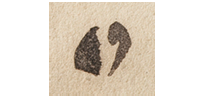 |
Bethku=ain-tri=eth: | The whole earth, or the largest place, the greatest enjoyment an earth the garden of the earth | |
| 2.22 | A |  |
Ebethchuaintrieth | Eternity |
| B |  |
E-Beth-ku-ain-trieth | The heavenly bodies, the worlds of light and glory, the heaven, heavens, and heaven of heavens—eternity. | |
| C |  |
Ebeth<=>ku<=>ain tri=eth. | All the heavenly bodies=Eternity | |
| P2,D2 | 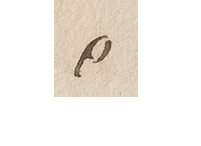 |
Ebethkuaintrieth— | a place beyond this earth a future place of existence, a place of residenden beyond this earth; the ceceles=tiale world; the heavenly bodies; the earth in its most sanctified state as it shall be= eternity. | |
| 2.23 | A |  |
Ebethcha | the greatest place of hapiness where God resides the Celesstial Kingdom |
| B |  |
E-Beth-Ka | The greater place of happiness, where God resides—The celestial Kingdom. | |
| C | 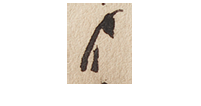 |
Ebeth=ka | The heaven of heavens, <wh[e]re god resides Ce[lestial]. K[ingdom].> the greatest place of hap | |
| P2,D3 |  |
Ebethka. | The celestial Kingdom where God dwells | |
| 2.24 | A |  |
Kah-tu-ain-tr◊th trieth- | |
| B |  |
Kah-tuain-trieth- | ||
| C |  |
Kah tu ain tri eth | ||
| P2,D4 | 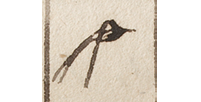 |
Ka<h>tu ain trieth: | an other Kingdom. govrned by different laws. a second king. or governed by another, or second person not having been exalted. | |
| 2.25 | A |  |
Kah-tu ain- | |
| B |  |
Kah-tuain- | ||
| C |  |
Kah tu ain | ||
| P2,D5 | 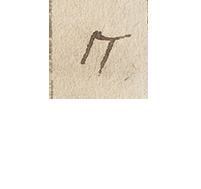 |
Kahtu=ain: | Another Kingdom governed by different laws, composed of subjects who receive their place at a future period, and governed by those who are under the directions of another; a kingdom whose subject differ one from another <in glory>; who come not into the pres behold not the face of of God | |
| 2.26 | A |  |
Dah-tu-hah-dees | |
| B |  |
Dah-tu-hah-dees | ||
| C |  |
Dah tu Hahdess Hahdees | ||
| P2,D1 | 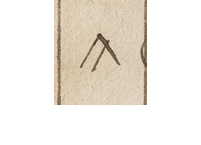 |
Dah tu Hah dees: | Hell another Kingdom; the least kingdom, or kingdom without glory; the whole kingdom and domin[ion] of darkness, with all its degrees and parts. governed by the Doagrass him who is an enemy to G<o>od. | |
| 2.27 | A |  |
Hah-dees | |
| B |  |
Hah-dees | ||
| C |  |
Hah dees | ||
| P2,D2 | 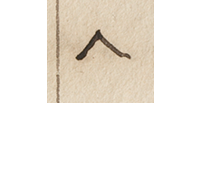 |
Hahdees= | Another kingdom of wickedness, not so extensive in duration, whos which government is under another, which th under the government of one who is an enemy to God over which he has not so much power as the fi<r>st, being less entensive— in its duration. | |
| 2.28 | A |  |
De-en De-eh | |
| B |  |
De-eh | ||
| C |  |
De=eh | ||
| P2,D3 | 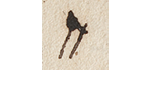 |
De=eh, | Another kingdom; the least of all kig over which Dah=Hah dees, or <the> king of Hell, cannot will not be permitted to exercise power at some fixed period. | |
| 2.29 | A |  |
Zip-zi-iota-veh | |
| B |  |
Zip zi-iota-veh | ||
| C |  |
Zip zi Iota Veh | ||
| P2,D4 |  |
Zipzi Iata veh. | I saw five women | |
| 2.30 | A |  |
Lish-zi-ho-e-oop-iota. | |
| B | 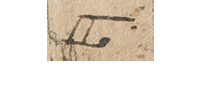 |
Lish-zi-ho-e-oop-iota | ||
| C |  |
Lish=zi=ho e=oop Iota | ||
| P2,D5 | 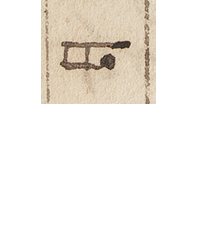 |
Lish Zi hoe oop Iota: | The glory of the celestial Kingdom: The connection of attributes; many parts perfected, and compounded into one Having been united; being united that which will be united, one glory above all other glories, as the the [sun?] excels in the light Moon in light, this glory excels being filled: with the same glory equaility | |
| 2.31 | A |  |
Gah-Mel. | |
| B |  |
Gah-Mel- | ||
| C |  |
Gahmel | ||
| P2,D1 |  |
Gahmel:— | a fair prospect of anthing: Land=scape; a place or country: face of The face of the country; beautiful scituated; an country under a promantory= a promising situation for man. | |
| 2.32 | A |  |
Ho-hah-oop | |
| B |  |
Ho-hah-oop | ||
| C |  |
Ho=hah=oop | ||
| P2,D2 | 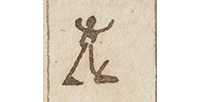 |
Ho=hah=oop=— | An intercessor; interce one who <has been> is appointed to intercede for another; invocation<;> | |
| Papyrus |  |
|||
| 2.33 | A |  |
Io-ho-hah-oop | |
| B |  |
Io-ho-hah-oop. | ||
| C |  |
Io=ho-hah=oop | ||
| P2,D3 | 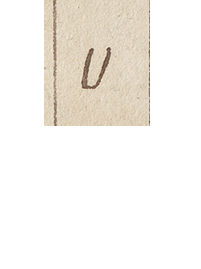 |
Io=ho-hah oop: | Tittle or dignity of one who is wait appointed to wait upon the king: one who is held in repute, trusty, honorable; who can be intrusted: The servant whom Abraham sent to get a wife for Isaac Most faithful; a tittle or dignity conferred upon women: a sign among the Egyptians that is used for influence or power: a sign made use of for one to escape his enemies: to excite commisseration, being had in honor, thereby affecting an escape. | |
| 2.34 | A |  |
Io-ho-hah-oop-zip-zi | |
| B |  |
Io ho-hah-oop-zip-si <zi> | ||
| C |  |
Io ho hah oop Zip Zi | ||
| P2,D4 | 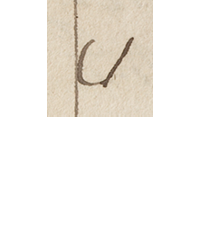 |
Io=ho=hah oop zipzi: | The title or dignity of one who is appointed to wait on the Queen; one who is held in repute; trusty honorable; who can be intrusted; a tittle or dignity conferred upon women: a sign among the Egyptians that is used for influence or power: a sign made use of for one to escape his enemies; to excite commisseration; being had in honor thereby effecting an escape | |
| 2.35 | A |  |
Jah-ho-e-oop | |
| B |  |
Jah-ho-e-oop- | ||
| C |  |
Jah-ho e oop | ||
| P2,D5 | 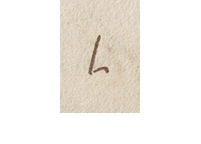 |
Jah=ho=e=oop; | An ambassador: one delgated with Kingly power; one authorized to ex[e]cute judgement for the King; a swift messenger one whose power cannot be escaped; one next to supreme; | |
| Papyrus* |  |
|||
| 2.36 | A |  |
Jah-hoNi-hah | |
| B |  |
Jah-ni-h◊h <hah> | ||
| C |  |
Jah=ho- <ni hah> | ||
| P2,D5 | 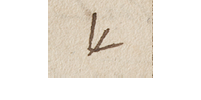 |
Jah-ni hah: | one delegated from the highest soar acting in or b[e]ing clothed with the power of an other; one from sent from the Celestial Kingdom | |
| P2,D4 | 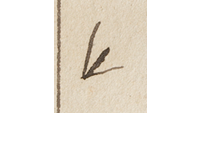 |
Jah ni hah= | one that with delegated and redeeming power, and second in authoraty; being a swift messenger going before, and having redeeming power, as second in authority: and stand next to on or on the right hand of power. | |
| P2,D3 | 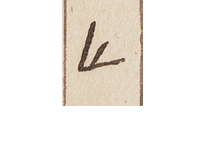 |
Jah ni hah: | One who will be delegated with redeem=ing power; who will be second in authority; a swift Messenger to go before; having redeeming power; one who will be second in authority; | |
| P2,D2 | 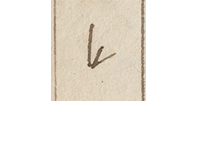 |
Jah=ni-hah= | one who was delegated with re=deeming power; one who was the second person in authority; a swift messenger; one that went before; having redeeming power; one who was second in authority | |
| P2,D1 | 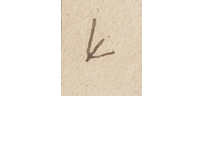 |
Jah=ho ni hah; | One delegated with redeeming power; a swift messenger; one that goes before another; one having redeeming power, a second person in authority; | |
| Papyrus* |  |
|||
| 2.37 | A |  |
Jah-oh-eh | |
| B |  |
Jah-oh-eh- | (the earth &c) | |
| C |  |
Jah-oh=eh | ||
| P2,D5 |  |
Jah-oh-eh | The earth under the governing <powers> of oliblish, Enish go on dosh, and Kai-e van rash, which are the grand governing key or in other words, the governing power, which governs the fifteen fixed stars <(twelve besides h◊◊◊s day)> that belong governs the earth, sun, & moon, (which have their power <in> one,) with the other twelve moving planets of this system. Oliblish=Enish go on dosh, and Kaie ven rash, are the three grand central stars which powers that govern all the other creations, which have been sought out by the most aged of all the fathers, since the begining of the creation, by means of the urim and Thummim: The names of the other twelve of the fixed stars are: Kolob, Limdi, Zip, Vurel, Venisti, waine, Wagoh=ox=oan, oansli, S◊eble Sheble Shineflis, flis, o◊s ots. The Egyptian names of the fifteen moving planets are: Oan isis, Flos-isis, flo’ese: Abbesele, Ele ash, Sabble, Slundlo, ear roam, Crash ma Kraw, obbles isem isim, Isinsbah Izinsbah. missel Nah me,sile ohee oop Zah, Zool | |
| P2,D4 | 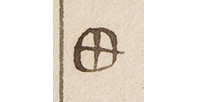 |
Jah-oh-eh— | The earth and power of attra[c]tion it has with the third fixed star, which is called Kai=e ven-rahh rash. | |
| P2,D3 | 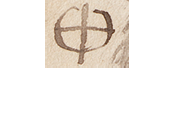 |
Jah-oh=eh | The earth under the government of an other <or the seconed> of the fixed stars, which is called Enish-go-an=dosh or in other words the power of attration it has with the earth. | |
| P2,D2 | 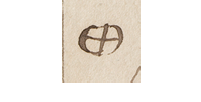 |
Jahoheh— | The earth under the government of another, which is one of the fixed stars; which is called Oliblish. | |
| P2,D1 | 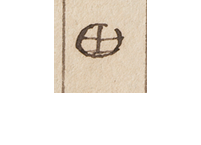 |
Jah=oheh: | The earth including its affinity with the other planets;, with their govering powers: which are fifteen: the earth; the sun, and the <the> moon, first in their affinity; including one power. | |
| 2.38 | A |  |
Flo-ees | |
| B |  |
Flo-ees- | (Moon) | |
| C |  |
Moh nit tish <Flo=ees> | ||
| P2,D5 |  |
Flo=ees | The moon, the earth and the sun in their annual revolutions | |
| P2,D4 | 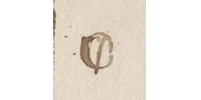 |
Flo=ees. | The moon in its revolutions with earth, showing or signifying the earth going between, thereby forming an eclipse | |
| P2,D3 | 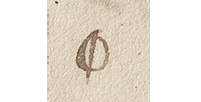 |
Flo=ees: | The moon— signifying its revolutions, also going between, thereby forming an eclipse | |
| P2,D2 | 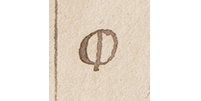 |
Flo=ees | The moon, signifying that which boroweth light, lendeth light, it being the lesser light. | |
| P2,D1 |  |
moh nit-tish Flo ees: | The moon in its affinity with the sun, and the earth. | |
| 2.39 | A |  |
Flos-isis. | |
| B |  |
Flos-isis. | (Sun) | |
| C |  |
Flos=isis | ||
| P2,D5 |  |
Flos isis— | The highest degree of light, because its component parts are light. The gover[n]ing principle of light Because God has said Let this be the centre for light, and let there be bounds that it may not pass. He hath set a cloud round about in the heavens, and the light of the grand govering of <15> fixed stars centre there; and from there its is drawn, by the heavenly bodies according to the<i>r portions; according to the decrees that God hath set, as the bounds of the ocean, that it should not pass over as a flood, so God has set the bounds of light lest it pass over and consume the planets. | |
| P2,D4 |  |
Flos-isis— | The night degree of light— the cheering the face of Millions of planets | |
| P2,D3 |  |
Flos-isis, | The sun in its affinity with Earth and Moon— signifying their revolutions showing the power, the one has with the other | |
| P2,D2 | 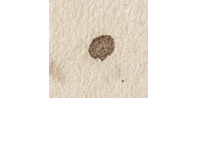 |
Flos isis | The King of day or the central moving planet, from which the other governing moving planets receive their light.— having a less motion— slow in its motion— The earth’s chief Joy. | |
| P2,D1 | 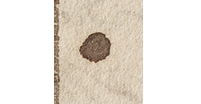 |
Flos=isis: | The King of day. or central moving planet, from which, those other gove[rn]ing moving planets receive their light. | |
| 2.40 | A |  |
Kli-flos-isis | |
| B |  |
Kli-flos-isis. | ||
| C |  |
Kli-flos isis | ||
| P2,D5 |  |
Kli flosisis | signifies Kolob in its motion, which is swifter than the rest of the twelve <fixed stars>; going before, being first in motion, being delegated to have power over others. to regulate others in their time, for example. one cubit of times signifies six <three> days therefore that which is appointed to run six <three> days, runs one cubit according to the measure of time in cubits a cubit of motion is increased or lessened according to the sign of the degrees | |
| P2,D4 | 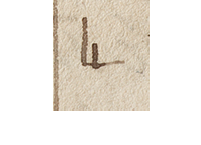 |
Kli floisis— | Measurement of time: it is used to signify twenty <four> cubits of measure=ment and is increased or lessened according to the sign of the degrees. | |
| P2,D3 | 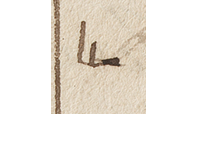 |
Kli flos isis= | time from now unto some fixed period of time, or a thousand years one that is set a part, and chosen to be delegated, but is not yet authorised: one who is highly qualified to be delegated or authorized: or qualification | |
| P2,D2 | 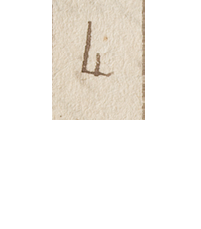 |
Kliflosisis. | time from the beginging of Creation to the flood:— or from fixed per[i]od to another fixed period: a messenger having performed certain acts, having been delegated with supreme power for a fixed period of time: hereditary, coming down from father to Son: right of authority from eight days old: according to the law of priesthood | |
| P2,D1 | 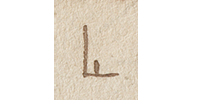 |
Kliflosisis— | signifies time— now, present, any messenger, being comissioned by supreme authority. | |
| Papyrus* |  |
|||
| 2.41 | A |  |
Veh-kli-flos-isis | |
| B |  |
Veh-Kli-flos-isis | ||
| C |  |
Veh kli flos-isis | ||
| P2,D5 | 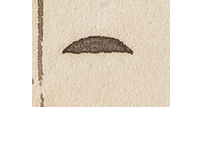 |
Veh Kli flos-isis | it signifies less power than the forth fixt governing star, but gre-ater power than the sixth governing star fixt star, in consequ[e]nce of its slow-ness of motion | |
| P2,D4 | 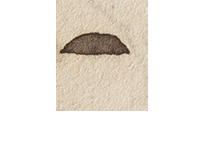 |
Veh kli flos-isis, | it signifies less power in its affinity with the first second third and fourth fixed stars, not having power to govern another, but having power in affinity with an-other to govern | |
| P2,D3 | 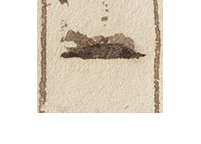 |
Vehkliflosisis | in its affinity with the first second third and fourth fixed Stars being Swifter in its motion according to the measurement of time, that is it takes more cubits to fill the time of its revolution | |
| P2,D2 | 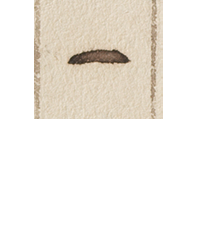 |
Vehkliflosisis | The same fixed star <planet> in its <motion> according to the cubit measurement of time. Four cubits: (that is <the lenght> from the end of the longest finger to the end of the other when the arms are extended: making in our measure seven feet, which is twenty=one inches to a cubit.) Twelve days are equal to four cubits. and | |
| P2,D1 | 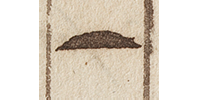 |
Vehklifloisis | The fifth planet <fixed star> in its motion (namely) Limdi, whose motion, according to the cubit measure of time is twelve <six> days to one cubit. | |
| Papyrus |  |
|||
| 2.42 | A |  |
Kolob | |
| B |  |
|||
| C |  |
Kolob | ||
| P2,D5 | 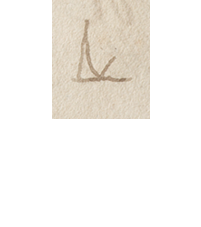 |
Kolob. | signifies the first creation nearer to the celestial, or the reside-nce of Lord, first in government, the last pertaining to the measure-ment of time, the measurement according according to celestial time which signifies, one day to a cubit which day is equal to a thousand years according to the measurement of this Eearth or Jah=oh=eh | |
| P2,D4 | 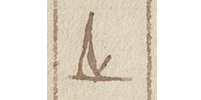 |
Kolob | it signifies first beginning to the bodies of this creation, the first creation, also having been appointed for the last time, the last or the eldest | |
| P2,D3 | 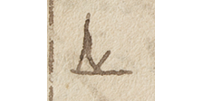 |
Kolob | signifies the highest degree of power in government, pertaining to heavenly bodies, | |
| P2,D2 | 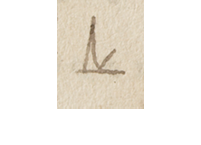 |
Kolob | in the second degree. It signfies the wonder of Abraham the eldest of all the stars, the greatest body of the heavenly bodies that ever was discovered by man | |
| P2,D1 | 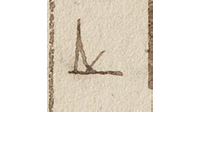 |
Kolob | in the first degree, It signifies the first great grand governing fixed Star which is the fartherest that ever has been discovered by the fathers which was discovered by Methuselar and also by Abraham | |
| Papyrus |  |
|||
| 2.43 | A |  |
||
| B |  |
|||
| C |  |
|||
| Papyrus |  |
|||
| 2.44 | A |  |
||
| B |  |
|||
| C |  |
|||
| Papyrus |  |
|||
| 2.45 | A |  |
||
| B |  |
|||
| C |  |
|||
| Papyrus |  |
|||
| 2.46 | A |  |
||
| B |  |
|||
| C |  |
|||
| Papyrus |  |
|||
| 2.47 | A |  |
||
| B |  |
|||
| C |  |
|||
| Papyrus |  |
|||
| 2.48 | A |  |
||
| B |  |
|||
| C |  |
|||
| Papyrus |  |
|||
| 2.49 | A |  |
||
| B |  |
|||
| C |  |
|||
| Papyrus |  |
|||
| 2.50a,b | A |  |
||
| B |  |
|||
| C |  |
|||
| Papyrus |  |
|||
| 2.51a,b | A |  |
||
| B |  |
|||
| C |  |
|||
| Papyrus |  |
|||
| 2.52 | A |  |
||
| B |  |
|||
| C |  |
|||
| Papyrus |  |
|||
| 2.53 | A |  |
||
| B |  |
|||
| C |  |
|||
| Papyrus |  |
|||
| 2.54a,b | A |  |
||
| B |  |
|||
| C |  |
|||
| Papyrus* |  |
|||
| 2.55 | A |  |
||
| B |  |
|||
| C |  |
|||
| Papyrus* |  |
|||
| 2.56 | A |  |
||
| B |  |
|||
| C |  |
|||
| Papyrus |  |
|||
| 2.57 | A |  |
||
| B |  |
|||
| C |  |
|||
| Papyrus |  |
|||
| 2.58 | A |  |
||
| B |  |
|||
| C |  |
|||
| Papyrus |  |
|||
| 2.59a–c | A |  |
||
| B |  |
|||
| C |  |
|||
| Papyrus |  |
Part 3
| No. | Doc. | Character | Sound | Explanation |
| 3.1 | A |  |
||
| B |  |
|||
| C |  |
|||
| 3.2 | A |  |
||
| B |  |
|||
| C |  |
|||
| Papyrus |  |
|||
| 3.3 | A |  |
||
| B |  |
|||
| C |  |
|||
| Papyrus |  |
|||
| 3.4a,b | A |  |
||
| B |  |
|||
| C |  |
|||
| Papyrus |  |
|||
| 3.5a,b | A |  |
||
| B |  |
|||
| C |  |
|||
| Papyrus |  |
|||
| 3.6a–c | A |  |
||
| B |  |
|||
| C |  |
|||
| Papyrus |  |
|||
| 3.7a,b | A |  |
||
| B |  |
|||
| C |  |
|||
| Papyrus |  |
|||
| 3.8 | A |  |
||
| B |  |
|||
| C |  |
|||
| Papyrus |  |
|||
| 3.9 | A |  |
||
| B |  |
|||
| C |  |
|||
| Papyrus |  |
|||
| 3.10 | A |  |
||
| B |  |
|||
| C |  |
|||
| Papyrus |  |
|||
| 3.11a,b | A | 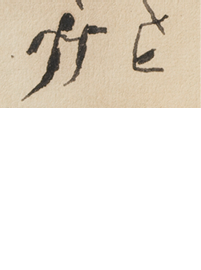 |
Ah broam=ah brahoam Ki Ahbraoam <Ki-ah-bram, Ki-ah-bra-oam-Zub-sool-oan.> | |
| B | 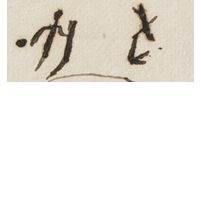 |
<Ki->Ah-broan, <Ki->Ah-bra-oam-. Zub-sool-oan <Zub-zool-oan>. | ||
| C | 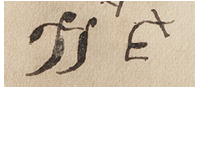 |
<Ki>Ah broam -ah <broam kiah> brah-oam zub zool oan | ||
| P1,D5 | 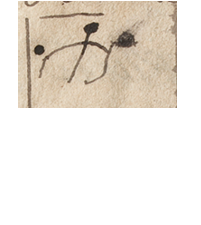 |
Kiah broam = Kiah brah oam = zub zool oan . . . Kiah brah oam. | Coming down from the beginning— right by birth— and also by blessing, and by promise— promises made; a father of many nations; a prince of peace; one who keeps the commandment of God; a patriarch; a rightful heir; a high priest. | |
| BoA–C | 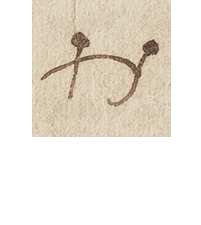 |
|||
| Papyrus |  |
|||
| 3.12 | A |  |
||
| B |  |
|||
| C |  |
|||
| Papyrus |  |
|||
| 3.13 | A |  |
||
| B |  |
|||
| C |  |
|||
| Papyrus |  |
|||
| 3.14 | A |  |
||
| B |  |
|||
| C |  |
|||
| Papyrus |  |
|||
| 3.15 | A | 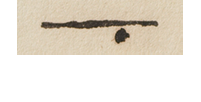 |
Iola nitah veh ah que | |
| B |  |
|||
| C | 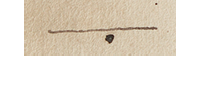 |
Iola ni tah veh=Ah=que | ||
| P1,D5 | 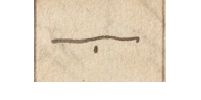 |
Iota nitahveh ah que. | Its signification is increased five times from the fourth. | |
| P1,D4 | 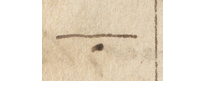 |
Iota nitahveh ah que. | Its signification is increased from the third degree five times. | |
| P1,D3 | 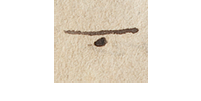 |
Iota nitahveh ah que= | Its signification is increased from the second degree five times. | |
| P1,D2 |  |
Iota nitahveh ah-que= | its signification is increased from the first degree five times: for instance I saw one hun five times twentyfive persons, or one hundred and twenty persons: It signification may be lessened one half by the mark as in the margin— and again lessened one half of the latter half the mark as in the margin It signification is increase tenfold by the mark as in the margin: Its signification is again increased one hundred fold by the the additional mark in the margin: Its sound is Ah=que kah Ju: and its signification is a multiplying adjective. | |
| P1,D1 | 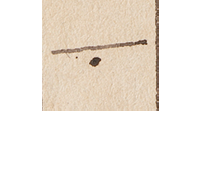 |
Iota nitahveh ah que— | a mark of distinction qualifying different degrees, increasing or lessening the power of the sentences according to their signification: as for instance Iota nitahveh ah que: (as in the margin) signifies twenty signifies “I saw twentyfive-persons,” or it signifies “twenfives persons” | |
| P1,D1 | 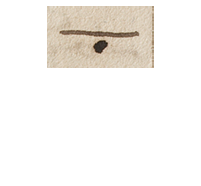 |
|||
| Papyrus* |  |
|||
| 3.16 | A |  |
||
| B |  |
|||
| C |  |
|||
| Papyrus* |  |
|||
| 3.17a,b | A |  |
||
| B |  |
|||
| C |  |
|||
| Papyrus |  |
|||
| 3.17c–e | B |  |
Part 4
| No. | Doc. | Character | Sound | Explanation |
| 4.1a,b | A |  |
||
| B |  |
|||
| Papyrus |  |
|||
| 4.2a,b | A |  |
||
| B |  |
|||
| C |  |
|||
| Papyrus |  |
|||
| 4.2c,d | B |  |
||
| 4.3 | A |  |
||
| C |  |
|||
| Papyrus |  |
|||
| 4.4a–e | A |  |
||
| B |  |
|||
| C |  |
|||
| Papyrus |  |
|||
| 4.5a–d | A |  |
||
| B |  |
|||
| C |  |
|||
| Papyrus |  |
|||
| 4.6a–c | A |  |
||
| B |  |
|||
| C |  |
|||
| Papyrus |  |
|||
| 4.7a–c,e | A |  |
||
| B |  |
|||
| C |  |
|||
| Papyrus |  |
|||
| 4.7d | B |  |
||
| Papyrus |  |
|||
| 4.8 | A |  |
||
| B |  |
|||
| C |  |
|||
| Papyrus |  |
|||
| 4.9a,b | A |  |
||
| B |  |
|||
| C |  |
|||
| Papyrus |  |
|||
| 4.10 | A |  |
||
| B |  |
|||
| C |  |
|||
| Papyrus |  |
|||
| 4.11 | A |  |
||
| B |  |
|||
| C |  |
|||
| Papyrus |  |
|||
| 4.12 | A |  |
||
| B |  |
|||
| C |  |
|||
| Papyrus |  |
|||
| 4.13 | A |  |
||
| B |  |
|||
| C |  |
|||
| Papyrus* |  |
|||
| 4.14 | A |  |
||
| B |  |
|||
| C |  |
|||
| Papyrus* |  |
|||
| 4.15a,b | A |  |
||
| B |  |
|||
| C |  |
|||
| Papyrus |  |
|||
| 4.15c | B |  |
||
| Papyrus |  |
Part 5
| No. | Doc. | Character | Sound | Explanation |
| 5.1 | A |  |
||
| B |  |
|||
| C |  |
|||
| Papyrus* |  |
|||
| 5.2 | A |  |
||
| B |  |
|||
| C |  |
|||
| 5.3 | A |  |
||
| B |  |
|||
| C |  |
|||
| 5.4 | A |  |
||
| B |  |
|||
| C |  |
|||
| 5.5a–c | A |  |
||
| B |  |
|||
| C |  |
|||
| 5.6 | A |  |
||
| B |  |
|||
| C |  |
|||
| 5.7 | A |  |
||
| B |  |
|||
| C |  |
|||
| Papyrus |  |
|||
| 5.8a,b | A |  |
||
| B |  |
|||
| C |  |
|||
| Papyrus |  |
|||
| 5.9 | A |  |
||
| B |  |
|||
| C |  |
|||
| Papyrus |  |
|||
| 5.10 | A |  |
||
| B |  |
|||
| C |  |
|||
| Papyrus |  |
|||
| 5.11 | A |  |
||
| B |  |
|||
| C |  |
|||
| Papyrus |  |
|||
| 5.12, 5.14 | A | 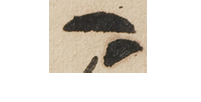 |
||
| B |  |
|||
| C |  |
|||
| Papyrus |  |
|||
| 5.13 | A |  |
||
| B |  |
|||
| C |  |
|||
| Papyrus |  |
|||
| 5.15a,b | A |  |
||
| B |  |
|||
| C |  |
|||
| Papyrus |  |
|||
| 5.16a,b | A |  |
||
| B |  |
|||
| C |  |
|||
| Papyrus |  |
|||
| 5.17 | A |  |
||
| B |  |
|||
| C |  |
|||
| Papyrus |  |
|||
| 5.18 | A |  |
||
| B |  |
|||
| C |  |
|||
| Papyrus* |  |
|||
| 5.19a,b | A |  |
||
| B |  |
|||
| C |  |
|||
| Papyrus |  |
|||
| 5.20a,b | A |  |
||
| B |  |
|||
| C |  |
|||
| Papyrus |  |
|||
| 5.21 | A |  |
||
| B |  |
|||
| C |  |
|||
| Papyrus |  |
|||
| 5.22 | A |  |
||
| B |  |
|||
| C |  |
|||
| Papyrus |  |
|||
| 5.23 | A |  |
||
| B |  |
|||
| C |  |
|||
| Papyrus |  |
|||
| 5.24 | A |  |
||
| B |  |
|||
| C |  |
|||
| Papyrus |  |
|||
| 5.25a,b | A |  |
||
| B |  |
|||
| C |  |
|||
| Papyrus* |  |
|||
| 5.26a,b | A |  |
||
| B |  |
|||
| C |  |
|||
| Papyrus* |  |
|||
| 5.27 | A |  |
||
| B | 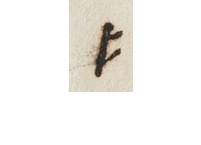 |
Za Ki<o> an<->hi<-a>sh, or Kulsid<o><a>n hish <hiash>— | The land of the Chaldeans. | |
| C | 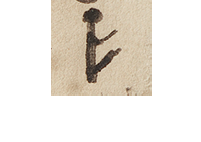 |
Za ki on=his, <hish,> <or> Kalsidon hish,— | The land of the chaldees | |
| P1,D5 |  |
Za Ki=o<a>n hi<a>sh, <or> chal sidon <a> his<a>h. | This character is in the fiftth degree, independent and abitrary. It may be preseved in the fifth degree while it stands independent and arbitrary: That is, without a straight mark | inserted above or below it. By inserting a straight mark over it thus, (2) it increases its signification five degrees: by inserting two straight lines, thus: (3) its signification is increased five times more. By inserting three straight lines, thus (4) its signification is again increased five times more than the last. By counting the numbers of st[r]aight lines and preseving them, or considering them as qualifying adjectives we have the degrees of comparison There are five connecting parts of speech in the above character, called Za-ki on hish These five connecting parts of speech, for verbs, participles— prepositions, conjuntions, and adverbs. In Translation Translating this chara[c]ter, this subject must be continued until there are as many of these connecting parts of speech used as there are connections or connecting parts found in the character. But whinever the character is found with one horizontal line, as at (2) the subject must be continued until twice <five times> the number of connecting parts of speech are used; or, the full sense of the writer is not conveyed. When two horizontal lines occur, the number of conne[c]ting parts of speech are continued five times furthr— or five degrees. And when three horizontal lines are found, the number of connections are to be increased five time further. The character alone has 5 parts of speech: increase by one straight line thus 5x5 is 25 by 2 horizontal lines thus 25 x 5 = 125; and by 3 horizontal lines thus:— 125 x 5 = 625 When this character has a horizontal line under it it reduces it into the fourth degree, consequently it has but four connecting parts of speech. When it has two horizontal lines, it is reduced into the third degree and has but three connecting parts of speech, and when it has three horizontal lines, it is reduced into the second degree and has but two connective parts of speech. | |
| BoA–C |  |
|||
| 5.28 | A | 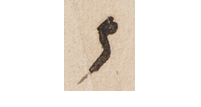 |
<Ah-braom—> Ah-bra-oam. | Signifies father of the faithful— The first right— The elder |
| A |  |
In the first degree Ah-broam—signifies The father of the faithful, the first right, the elders second degree—same sound—A follower of sig rightiousness— Third degree—same sound—One who possesses great Knowledge— Fourth degree—same sound—A follower of righteousness, a possessor of greater of Knowledge. Fifth degree— Ah-bra-oam. The father of many nations, a prince of peace, one who keeps the commandments of God, a patriarch, a rightful heir, a high priest. | ||
| B |  |
|||
| C | 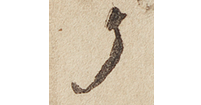 |
Za ki on hish Ah=brah oam, | The father of the faithful The first right, unto <thrug [through]> unto whom is committed, | |
| P1,D5 | 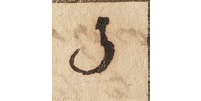 |
Ah brah-aam— | a father of many nations a prince of peace, & one who keeps the commandments of God. A patriarch a rightful heir, a highpriest | |
| P1,D4 |  |
Ahbroam: | a follower of righteousness a possesser of greater knowledge— | |
| P1,D3 |  |
Ah-broam. | one who possesses great knowledge | |
| P1,D2 | 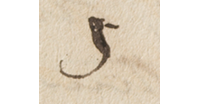 |
Ah=brah=oam— <Ah=broam> Ah broam— | a follower of righteousness | |
| P1,D1 | 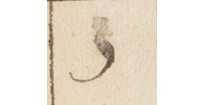 |
Ah=brah= <br>oam— | <The> Father of the faithful. The first right— The elder | |
| BoA–C |  |
Book of Abraham Manuscripts, circa July–circa November
1835
| No. | Doc. | Character | Sound | Explanation |
| 1 | BoA–A |  |
||
| BoA–B |  |
|||
| 2 | BoA–A |  |
||
| BoA–B |  |
|||
| BoA–C |  |
|||
| 3 | BoA–A |  |
||
| BoA–B |  |
|||
| BoA–C |  |
|||
| 4 | BoA–A |  |
||
| BoA–B |  |
|||
| BoA–C |  |
|||
| 5 | BoA–A |  |
||
| BoA–B |  |
|||
| BoA–C |  |
|||
| Papyrus |  |
|||
| 6 | BoA–A |  |
||
| BoA–B |  |
|||
| BoA–C |  |
|||
| Papyrus |  |
|||
| 7 | BoA–A |  |
||
| BoA–B |  |
|||
| BoA–C |  |
|||
| Papyrus |  |
|||
| 8 | BoA–A |  |
||
| BoA–B |  |
|||
| BoA–C |  |
|||
| Papyrus |  |
|||
| 9 | BoA–A |  |
||
| BoA–B |  |
|||
| BoA–C |  |
|||
| Papyrus |  |
|||
| 10 | BoA–A |  |
||
| BoA–B |  |
|||
| BoA–C |  |
|||
| Papyrus |  |
|||
| 11 | BoA–A |  |
||
| BoA–B |  |
|||
| BoA–C |  |
|||
| 12 | BoA–A |  |
||
| BoA–B |  |
|||
| BoA–C |  |
|||
| 13 | BoA–A |  |
||
| BoA–B |  |
|||
| BoA–C |  |
|||
| 14 | BoA–A |  |
||
| BoA–B |  |
|||
| BoA–C |  |
|||
| 15 | BoA–A |  |
||
| BoA–B |  |
|||
| BoA–C |  |
|||
| Papyrus |  |
|||
| 16 | BoA–A |  |
||
| BoA–B |  |
|||
| BoA–C |  |
|||
| Papyrus |  |
|||
| 17 | BoA–A |  |
||
| BoA–B |  |
|||
| BoA–C |  |
|||
| Papyrus |  |
|||
| 18 | BoA–A |  |
||
| BoA–B |  |
|||
| BoA–C |  |
|||
| Papyrus |  |
|||
| 19 | BoA–A |  |
||
| BoA–B |  |
|||
| BoA–C |  |
|||
| Papyrus |  |
|||
| 20 | BoA–C |  |
||
| Papyrus |  |
|||
| 21 | BoA–C |  |
||
| Papyrus |  |
|||
| 22 | BoA–C |  |
||
| Papyrus |  |
|||
| 23 | BoA–C |  |
||
| Papyrus |  |
|||
| 24 | BoA–C |  |
||
| Papyrus |  |
|||
| 25 | BoA–C |  |
||
| Papyrus |  |